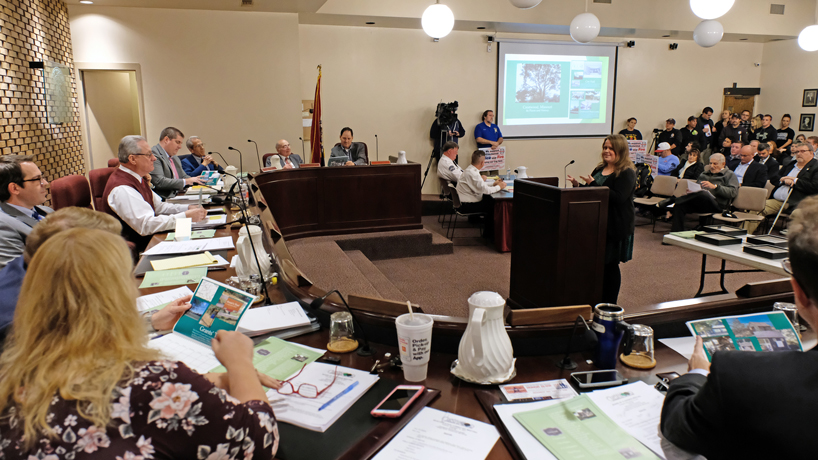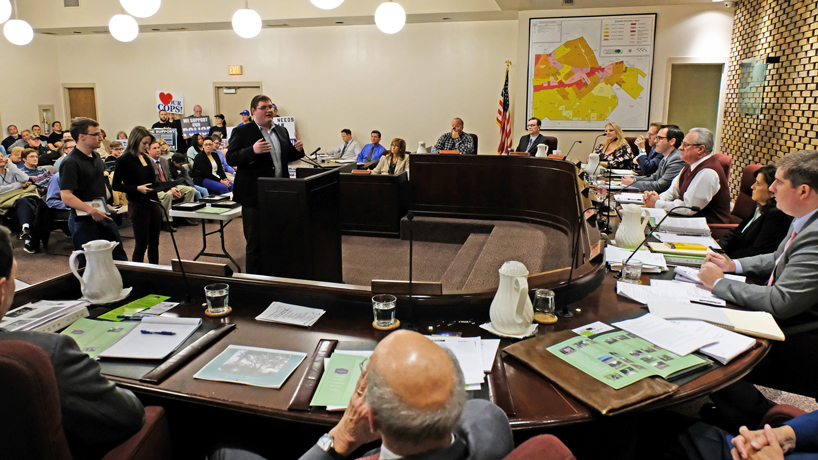
History major Anne Vandelicht (at lectern) presents a calendar she created for the City of Crestwood during a Board of Aldermen meeting on Nov. 14. (Photos by August Jennewein)
There is a stark contrast between the final segment of Crestwood, Missouri’s historical timeline and its earlier, more colorful counterparts.
The opening segments document the community’s first settlers and carry readers along a path that led to a thriving community through the stories of first responders and area businesses.
But while the last shadow box in the timeline lacks visually in comparison, the University of Missouri–St. Louis students who compiled the material consider the segment to be the most symbolic.
The limited details and absence of photos represent a developing community – one with an unwritten future.
“That’s honestly the beauty of understanding history – not that you’re able to just appreciate what’s come before, but that you’re able to create and ensure that futures can be made here,” communications major Logan Babb said while presenting to the Crestwood Board of Aldermen on Nov. 14. “That’s what I think Crestwood has done so wonderfully.

Communications major Logan Babb (at lectern) delivers an impassioned presentation during a Crestwood Board of Alderman meeting as part of a service-learning course offered through the Pierre Laclede Honors College.
The adoration Babb displayed for Crestwood during the presentation could rival the fervor of a loyal resident. But having never heard of the town before August, his admiration for the community developed in a matter of months – during a semester-long course to be exact.
A senior in UMSL’s Pierre Laclede Honors College, Babb enrolled in his first service-learning class simply to fulfill a graduation requirement. The class quickly took on a deeper meaning, though, as it offered an unconventional approach to history education.
Taught by adjunct instructor Rob Wilson, the course dubbed “Where We Live” takes St. Louis history outside the classroom walls and into city centers. Typically, Wilson focuses the instruction on two regional towns that have rich but dramatically different pasts.
The fall offering marked the fourth time Wilson has taught the course – this time taking students to Crestwood and Pagedale.
In addition to studying these communities, students created projects at the request of city leaders. These materials range from the historical timeline, which will be displayed in the Crestwood Aldermanic Chambers, to brochures, calendars and many other documents that highlight community stories.
When developing these projects, students of course scoured through archives and other historical documents, but they also met with longtime residents who could provide context to the facts and figures. It was these interactions that inspired students and encouraged them to be more proactive in their own communities.
“You can feel detached and honestly not appreciate what’s around you if you don’t know what’s there,” Babb said. “My knowledge of St. Louis has greatly increased during this class. I’ve been able to empathize and get in touch with people that I otherwise would not have understood. It’s honestly increased my breadth of knowledge of the people and places around me.”
To conclude the course, students presented their research and projects to the Boards of Aldermen in both Pagedale and Crestwood. The student-generated materials will remain with the city governments to be displayed or distributed.
“I hope that the projects not only inspire people who have seen the materials but that it will encourage residents to find out more about the history of their neighborhoods,” Wilson said.
Students received an echoing applause from a standing-room-only crowd during the Crestwood Board of Aldermen meeting in November, so it appears they may have taken an initial step toward achieving Wilson’s goal.
Presenters were met with equal appreciation in Pagedale, where they told oral histories of longtime residents, displayed a poster of city churches and presented a book filled with artwork created by area residents.
Following their research, many students have a deeper appreciation for these communities – areas that were once just stops along their commute through the region.
“I didn’t have a connection with either community before,” senior Audri Adams said. “But once you hear the stories of people and you see how involved they are with their community, it’s really inspirational.”
Adams, a history major who aspires to one day teach at the college level, also drew inspiration for her future career.
“This is the kind of stuff that I actually really like is doing service-learning things,” Adams said. “It’s opened my eyes to what I could possibly do because I want to be a professor. It really opens your horizons and gives you a new perspective.”
Each week, students also paused from working on their individual projects to discuss a topic presented by Wilson. These enlightening conversations allowed students to share varying opinions and perspectives while strengthening their bond as classmates.
“I have learned more about our city in this class than I have in all of the other classes I’ve taken here combined,” Babb said. “There’s such detail and focus on different topics. It’s such a valuable experience to have.”















